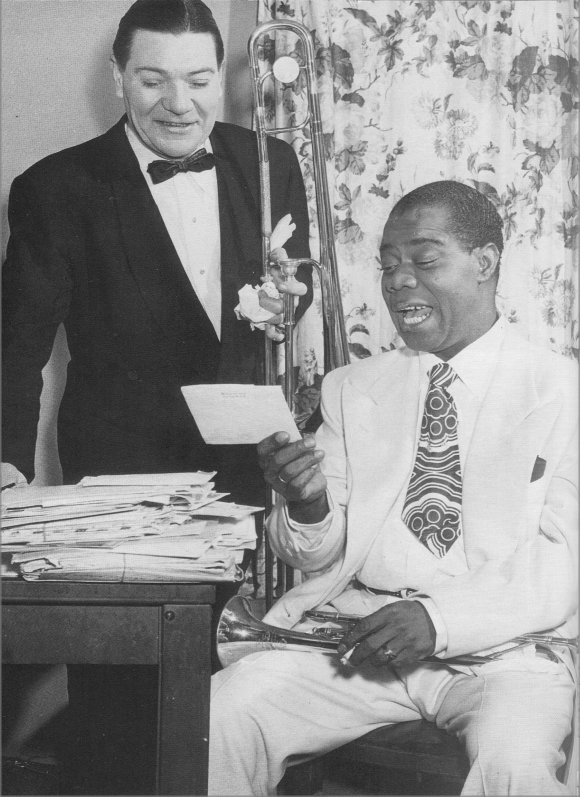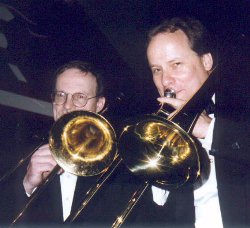This edition of Riverwalk Jazz is the second of two hour-long tributes to Jack Teagarden featuring trombonist and bandleader Rex Allen; included is archival tape of Jack Teagarden talking about his life in music, courtesy of Joe Showler's Jack Teagarden Collection.
.jpg)
Portrait of Jack Teagarden © William P. Gottlieb, Library of Congress, Public Domain.
Jack's collaborations with trombonists Abe Lincoln and Glenn Miller, and his glory years with Louis Armstrong's All-Stars are the focus of this radio show.
One day in 1927, a soft-spoken 22-year-old country boy with a Texas drawl and a polite manner checked into the Marie Antoinette Hotel on West 66th Street in Manhattan. Nobody could have guessed that the shy young man with a trombone case, was about to take New York City by storm.
Ten years later, Jack Teagarden was a jazz star, in top form after a five-year stint with the Paul Whiteman Orchestra and now leading his own big band.
Jack and Glenn Miller were scheduled for a recording session with Benny Goodman for the Columbia label. It was February in 1931. Goodman sent the two trombonists off to write a new arrangement and introduction to the jazz standard "Basin Street Blues." Helen Miller kept Jack and Glenn fueled with black coffee during an all-night writing session that resulted in the now familiar opening notes and famous lines to "Basin Street Blues." Won't you come along with me— to the Mississippi, We'll take a trip to the land of dreams, Blowing down the river, down to New Orleans.

Peanuts Hucko, Jack Teagarden and Jack Lesberg at the Famous Door, New York, July 1947. © William P. Gottlieb, Library of Congress, Public Domain.
All through the war years, from 1939 to 1946, Jack Teagarden kept his own Orchestra together. It was never successful financially—mainly because Jack couldn't have cared less about running a business. But, Jack and his Orchestra toured extensively, worked in Hollywood film studios, and made many important recordings, including V-Discs and Armed Forces Radio broadcasts for the troops overseas.
Jim Cullum says:
"My father played with Teagarden's Orchestra in the Forties. He first met Jack in Dallas around 1940 and they jammed together several different times. Neither one of them could get their fill of music and they'd play all night. That was the start of a long friendship. In 1946 my father joined Jack's big band and played saxophone in the reed section, and some clarinet in a small seven-piece group that would come down front. They call it a 'band within a band.' That's what he enjoyed the most...improvising with Jack in those small ensembles.
"Years later I had the good fortune to know Jack. He visited our home in San Antonio. I followed his band around the state to catch his concerts. Once in Houston, I actually sat in with the Teagarden band. And one of my favorite things was hearing Jack's stories. I'm nostalgic about hearing these old recordings of Jack's voice. It's like a flashback for me—hearing these stories again."

Jack Teagarden and Louis Armstrong. Photo courtesy jackteagarden.info.
In the late 1940s, Jack Teagarden teamed up with Louis Armstrong in a collaboration that lasted four years. One of the most exciting pieces of music to come out of this period was a memorable Town Hall Concert duet Armstrong and Teagarden performed on "Rockin' Chair."
Jim Cullum says:
"We're lucky that a recording was made that night; you can hear the pure joy that Jack and Louis took in playing and singing together. They were such kindred spirits during those years in the late '40s. When they were together every night, they were really playing to and for each other."
Armstrong often spoke of his appreciation for Teagarden. He once said, "I love Jack Teagarden...and his music...and the soul he displays when he's pouring out his heart in that trombone."

Mike Pittsley playing Abe Lincoln's late 1930s vintage NY Bach (#12 bell and #16 slide) and Rex Allen playing Jack Teagarden's Conn 4H.
Another bright highlight of Jack Teagarden's career was a recording he made in October 1955 with cornetist Bobby Hackett—known as the Coast Concert. On this date Jack played a remarkable duet with the renowned hot jazz trombonist Abe Lincoln, mentor of Jim Cullum Jazz Band trombonist Mike Pittsley.
On this radio show, Mike plays the very same trombone Abe Lincoln used on that 1955 recording and Rex Allen, a lifetime Teagarden disciple, plays Jack Teagarden's Conn 4H horn. In an excerpt from the original recording, we hear Jack Teagarden and Abe Lincoln go at it, followed by Rex and Mike playing their own version of the classic "That's a Plenty."
Photo credit for Home Page: Jack Teagarden and Louis Armstrong. Photo courtesy wat.tv.
Text based on Riverwalk Jazz script by Margaret Moos Pick ©2001

